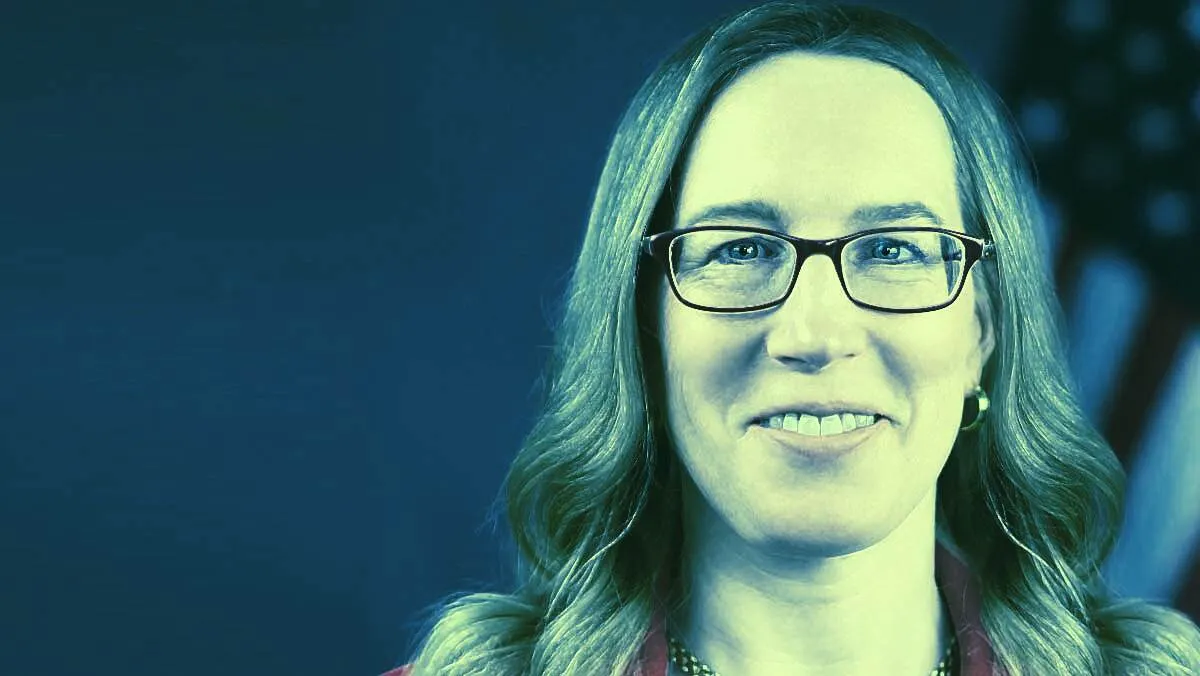In brief
- SEC Commissioner Hester “Crypto Mom” Peirce spoke today at the LA Blockchain Summit.
- Peirce is working on an updated version of her Safe Harbor proposal for crypto firms.
- She said she disagrees with the SEC’s recent “heavy-handed” Unikrn settlement.
United States Securities and Exchange Commission (SEC) Commissioner Hester Peirce is so well-known for her pro-cryptocurrency views that she’s affectionately referred to as “Crypto Mom.” She has also publicly disagreed with her colleagues on such matters as the SEC’s legal action against Telegram’s abandoned crypto project.
However, Peirce admits that she’s still trying to win over those colleagues in some matters, particularly when it comes to her “safe harbor” proposal for crypto startups.
Unveiled earlier this year, the proposal would provide a three-year grace period before developers are subject to existing securities laws, allowing time for a project to fully form and evolve.
In a streaming interview with journalist and podcaster Laura Shin today at the LA Blockchain Summit, Peirce discussed plans to revise her safe harbor proposal after taking feedback from colleagues and others in the crypto space—a “Version 2.0” rendition, she said.
“I haven’t yet convinced my colleagues to do something like that,” she said of the proposal. “I’m still hopeful that I will be able to.”
While Peirce wouldn’t specifically speak to her SEC colleagues’ opinions on the matter, she noted that one part of the proposal that may see further development is in regards to stronger protections for token purchasers. She said that she’s considering how disclosures could play a role in the proposal, or perhaps how technology itself could provide a path to limiting how quickly founders can sell their tokens.
In any case, Peirce admitted that the SEC’s other matters have kept her from focusing too much time on it, and that the crypto industry continues to change all the while. She still seeks to revise the proposal and try to get some more allies onboard, however. “I think I still need to do version 2.0 in order to win folks over, so that’s what I’m hoping to do,” she added.
On the topic of dissent from her peers, Peirce was asked about the SEC’s September settlement with Unikrn over its gaming and esports-centric token. Although the ICO brought in investments from the likes of Mark Cuban and Ashton Kutcher, it was ultimately deemed an illegal sale of securities. The company agreed to pay a $6 million fine and cease operation of the token.
“I felt that it was a rather heavy-handed settlement,” she said, noting that the issue was related to registration as a security rather than findings of fraud. “Given that, it seemed rather extreme to take the action we did, which was depriving the firm of all of its liquid assets.”
Peirce suggested that such action discourages innovation and that the settlement was “a very strange remedy” in her view. It’s also an example of how the safe harbor proposal could help, she suggested.
“These are really complicated questions, and that’s part of the reason that I think we need a safe harbor,” she said of Unikrn. “It’s not always easy to tell if something is a security or not, but in this case, I think there was a case to be made that this was not being sold as a security.”
Peirce noted that she’s open to the idea of tweaking securities laws as a remedy, rather than simply push ahead with her safe harbor proposal. However, she suggested that it could be a poor fit for some tokens that probably should not be considered securities. “We might end up with tokens that are stuck in a securities laws framework after a point where it doesn’t really make sense for them to be in such a framework,” she said.
Ultimately, the crypto industry is challenging to regulators who are used to traditional financial products, and the booming decentralized finance (DeFi) market is a key example of that. Peirce is personally interested by the promise of DeFi, she said, including how it almost “self-regulates” by being overseen by a community. Government regulation, meanwhile, will be difficult.
“There’s some real potential for some major and revolutionary change coming out of the DeFi space… that will challenge the regulatory structure in a number of ways,” she said. “We’re going to have to ask a lot of really difficult questions about what that means and about how we regulate things.”

